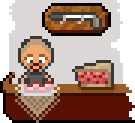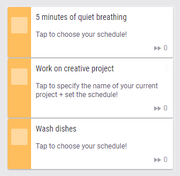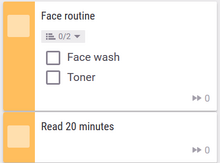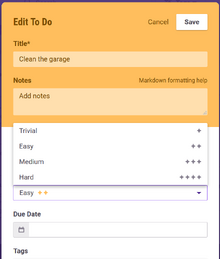 |
This page contains one or more outdated guild links.
Guilds and the Tavern were removed from Habitica on August 8, 2023. If you know the status of the guild(s) mentioned in this page, please update their links and remove the template |
Adapting Habitica for players with ADHD is simple and fun. Gamifying a self-management system can help adults and children make effective and positive change in their lives. While these life hacks may prove helpful to many, these suggestions are not being made by medical professionals and in no way should substitute for the care of a licensed physician. It's also important to note that strategies that prove helpful to some may not be helpful for all.
Everyone's personal level of success with these adaptations will vary. Sometimes, there may be more than one strategy for a similar concept; the important thing is to remember that what works for one player may not be the right strategy for another player. Play to your strengths!
The first thing you should do if you have ADHD is head over to the ADHDers Guild and say hello! There are a lot of friendly Habiticans with ADHD who would be thrilled to get to meet you and answer any questions you might have. Many of them have contributed their incredible ideas to this wiki page!
Gamifying Your Turbo-Brain: How Habitica Works With ADHD[]
For more detailed information about the behavioral science behind Habitica and for definitions of the terms used below, visit Behavioral Science Behind Habitica.

An example of positive reinforcement.
Operant conditioning is a form of learning in which a person associates their actions with the consequences of those actions. When the consequences are deemed good, a person will engage in that action or behavior again. If the consequences seem unfavorable, a person may not take that action again, to avoid the unpleasant consequence.
Habitica ties your actions to consequences that you find pleasing, which reinforces your behaviors. You will complete more Tasks to receive more gold, XP and drops. You will realize that failing to do your Tasks may result in a loss. You may find yourself reducing your actions that keep you from getting ahead in the game. Consequences that reduce the occurrence of actions, called punishments in behavioral science, show up in Habitica through loss of Health Points (HP), Death, and loss of items.
Reinforcement and punishment occurs in steady predictable ways, like the way tasks always result in gains, but they can also occur randomly, as in the case of drops. Playing the game is motivated by both the credit you know you will receive, and the hope you'll get a bonus.
In addition to the scheduled and unscheduled reinforcement, you will find yourself wanting to complete more tasks because there are additional and moving targets to be met, including achievements, badges and item counts. You will want to earn enough gold to purchase more equipment, score more Mana (MP) to use your skills, and go on more quests to gain more eggs, quest scrolls and bonuses.
This reinforcement is also very visual. You can see the pets, and the black pawprints that remind you that you have more space in your stable to fill. MP and HP bars allow you to assess your current state in one glance. Seeing tasks go from yellow (neutral) to red (falling behind) helps you prioritize To Do's and evaluate your daily routine much more easily than trying to make a list on paper.
Habitica is set up to support you if the in-game reinforcement is just not enough. The Tavern is a community of supportive players, and all are ready to cheer you on and get you back on track. You can also join a party, and tie your success in with theirs, as you complete quests and use skills to protect one another. Sometimes doing it for others is more motivating than working alone, and sharing a collective goal can either cushion the blow of a bad day or make you even prouder of a good day.
Getting into a Positive Mindset[]
Your success will rely largely on your approach. If you've started using Habitica, and you've found this page, you are already well on your way towards making positive changes in your life. It should highlight for you that every small step of progress is worth something. Every time you complete a task and receive the XP, gold and drops, you deserve the rewards you receive for sticking with the plan you've created.
Habitica will let you see your entire day in manageable pieces. It isn't too daunting to complete a routine if it's broken up into steps, and it is not an all-or-nothing challenge if you can see all of the successes you can have even if you miss one task one day. The loss of HP reminds you to stay on track, while the continuing growth you are making keeps you motivated to keep playing.
Visualizing that routine, getting it down into Dailies, To Do's and Habits, and being able to move the Tasks around allows you to adapt your routine to best fit your needs. You get to analyze your day at the end of every day. If you see that you need help, you are surrounded by players who can help and guilds and guides to help you as you play. Check out the list of sites at the end of this wiki. There are so many resources available to you on this wiki and on the Habitica site!

If you are consistently missing a Daily, seeing it change from neutral yellow to darker shades of red can help you focus on making a change instead of concentrating on what you might have otherwise considered a failure. Maybe you weren't ready for that Daily, or perhaps your system doesn't quite support you the way it can. Consider making it a Habit and giving yourself credit every time you are able to do it. When you're ready, you can move that Habit over and make it a Daily again.
Getting Started[]
When you are setting up your tasks, think about how you are best motivated and what you are working on right now.
Being Realistic[]
Be realistic when making specifications. If you are just starting your daily walks, set them up for a reasonable amount of time and if you are just starting daily sit-ups, aim for doing five regularly before you increase the number you expect to do.
Number of Tasks[]
Remember to create tasks for the things that are part of your daily routine, not just the things that are hard or that you are trying to learn to do more often.
It's easy to go overboard when it's so much fun to gamify your day, but don't set yourself up for disappointment, anxiety or loss of HP by creating an unmanageable number of Dailies and To Do's. It is fine to start small!
Naming Tasks[]
Use emojis and take advantage of the way they pair text with visual reminders. This will make it easier to glance over your tasks, and you may find yourself getting less caught up in a screen full of text.
If you are having trouble doing something at a specific time, or a specific time is daunting as you start out, give yourself a range of time when you create your Task. For example, if getting up on time is really hard, it's more reasonable to say, "I will wake up between 7:00 am and 8:00 am" than to name a specific time like 7:15 am. The same can be used for bed times and meal times.

Specificity, through checklists and clear time expectations for example, can help you check off tasks.
Specificity[]
Be specific when you are naming your tasks. "Exercise" is easier to brush off, forget or do sloppily. "Walk around the block before breakfast" and "Complete 15 push-ups" are very specific and will be easier for you to target. In fact, clear rules on how or when to complete a task might make it feel more like a game.
Add something interesting to your Tasks as you name them to make boring routines more challenging and engaging. You might decide to do something on one leg or while humming, and you can identify that variation in the Task name.
Building Your Dailies List Slowly[]
If you're worried you won't be raising the bar if you start with a reasonable number of tasks, create a one-day-a-week Daily called "Add one more item to my routine" to build your Dailies up over time. "Review Dailies" or "Am I ready to add another Daily?" By reviewing your system regularly, you can build up your Dailies whenever the game is feeling easy.
This doesn't necessarily mean that you should add another Daily to your routine! This can be one checklist item in a preexisting Daily; it can also amplify a preexisting Daily. For example, you might add another minute of exercise to a five-minute exercise daily, or add another step into your morning routine Daily.
Factoring in Task Difficulty[]

Identifying the difficulty of a task can be very helpful.
Make sure that you don't add something that's already difficult! If you have a hard time remembering to exercise, maybe that Daily needs to be toned down instead of up. On the other hand, if you find that your "meditation" Daily is simply too easy, you might want to add another minute (or longer!) to that Daily instead.
Use the Difficulty options when you set up your Dailies, To Do's and Habits. Label the tasks that you are trying most to encourage, as Hard, and the tasks that are part of your routine that you are doing with the most success, as Easy.
Using Data []
Accessing the Data Display Tool (DDT) through the Data tab will help you see how much progress you have made in a day and how much damage you may take on anything that remains undone. Get familiar with that page but make sure it doesn't pressure you. Use the DDT to get an idea of how much damage your entire day would come to if you did not complete a single Daily. Perhaps to start, you should make your Dailies worth less than 20 HP of damage. You won't face death, but you'll feel a bit of push to try again tomorrow.
Remember that for progress to last long-term, slower is better than faster. A small change that you find relatively easy is likely to last much longer than a big change that you find hard to implement into your Daily routine.
Breaking It Down[]
While helpful for everyone, breaking a task down into smaller steps can be especially important for those with ADHD. This is where checklists come in. You can use them on Dailies and To Do's and are a great way to give yourself credit for completing smaller parts of a task. It can help you feel like you are making progress and help keep you motivated to finish the task.
If a part of your routine has multiple steps and you are doing this task frequently, create a checklist. If you need to start small, or if you haven't quite cemented all of the steps, break that element of your routine in separate tasks. Either way, you will be able to reward yourself in part for the progress you are making and still feel motivated to gain more XP and gold next time.
You can also add a Habit that corresponds with the Daily Checklist. For each checklist item that you check off on any Daily, you can check off that Habit once (that way, you will gain XP and GP for each step, not just for completing the Daily).
Habits can also be used as reminders and dividers to better organize your Habits and keep them more visually appealing.
Staving off burnout and boredom[]
There are ways to turn easy tasks into more challenging tasks, or setting goals for yourself beyond simply meeting your daily routine. For example, aim to do an entire routine within a small amount of time, aim to hatch your pets in a specific order and keeping working until you get your drops, or try to get specific badges within six months. Visit the burnout page for more ideas from Habiticans just like you.
Suggested Activities[]
Many Habiticans with ADHD have compiled a list of helpful Tasks. These are all activities and lifestyle changes that can be a part of your routine, if you find that these apply and may motivate you.
Remember to start small. If you don't exercise frequently, or cannot run a mile, start with 5 minutes of yoga or walking, or specify the distance you will walk or run.
- Take Meds, Vitamins and/or Supplements
- X Minutes of Meditation
- X Minutes of (or X Sets of) Specific Exercise
- Go to Bed between X:00 and X:00 (rewarded at the end of the day)
- Went to Bed between X:00 and X:00 (rewarded the next morning)
- Set a Mindfulness Bell During X Activity to Stay Focused
- Have a journal or other writing pad that you can keep in your pocket and write important notes and reminders on once you are notified of them.
- Externalize tasks by using reminders, Post-It notes, or anything else that is in your visual field.
Other Resources on Habitica and This Wiki[]
Many players use Habitica as a way to maintain their routines as they work and live with distractions, disabilities and difficulties. You should explore the Tavern, The Keep and the Guilds to find more players like you to gain the support of a community and the wisdom the players bring. The links below are just a few suggestions to get you started:
- Burnout
- Pomodoro Technique
- Overcoming Procrastination
- SMART Goal Setting
- The Carrot vs. Stick Challenge for optimizing your Habitica strategies over time (Wikipedia)
- The Keep:ADHDers Guild Page (or A Fortaleza:TDAHabiticans in Brazilian-Portuguese)
Guilds for ADHD:
- ADHDers Guild: This is a guild for those of us with ADD/ADHD using Habitica to help manage the issues of motivation, distraction, and other impairments that come with our disorder. If you want to talk about ways to manage your ADD/ADHD outside of Habitica, have intelligent discussions about the disorders and stereotypes associated with them, find resources about ADD/ADHD, ask a question about the disorder, or if you just want to have a chat then you have come to the right place. We have a kind, friendly, and dedicated community that is here to help and is focused on ensuring that your experience with Habitica is - Hey look! Something Shiny!
